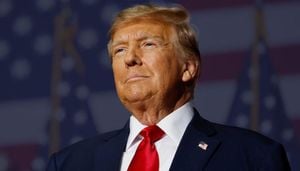With the election of Donald Trump as President of the United States for his second term, the foreign policy and national security deck is being reshuffled once more, reminiscent of his erratic approach during his initial administration. The recent announcements of key appointments reflect Trump's return to the "America First" doctrine and indicate how he may prioritize international relations and security issues moving forward.
This week, Trump confirmed the appointments of key figures including Florida Senator Marco Rubio as Secretary of State and Congressman Mike Waltz as National Security Adviser. These selections not only signify Trump's intention to place strategic emphasis on China but also show his familiarity with these individuals, who have previously championed the traditional Republican approach to foreign policy.
Historically, the Republican Party has been home to prominent neoconservatives, who often advocated for military interventions and regime changes abroad. Rubio and Waltz, once champions of such strategies, have shifted their rhetoric to resonate more with Trump's populist stance. This transformation highlights the broader ideological shift within the GOP, especially following the repercussions of the Iraq War and changing global dynamics.
“Choosing Marco Rubio and Michael Waltz suggests he’s not interested in just sort of burning down the house, so to speak. These are traditional proponents of strong American alliances and military forces,” noted Michael O’Hanlon, Director of Research for the Foreign Policy Program at the Brookings Institution. The appointments reveal the tightrope Trump must walk: maintaining strong defense posture without resorting to the interventionist policies favored by his predecessors.
Waltz's pick reinforces the notion of increasing military readiness, as he has voiced consistently about the need to counter potential threats from China. He proposes shifting focus from conflicts like those in Ukraine and the Middle East to what he views as the more pressing issue of Chinese expansionism. Having declared the U.S. is currently embroiled in a "cold war" with China, he expresses urgency to prepare for possible confrontations.
When considering potential economic policies, tariffs on Chinese imports loom large. Trump has reiterated his commitment to imposing hefty tariffs as part of his economic agenda. Early action on such tariffs may help him fulfill promises made during his campaign, creating ripples through international trade and business relations.
On the diplomacy front, Trump's focus on Israel also emerges as he named Mike Huckabee, former Arkansas Governor and vocal supporter of Israel, to the ambassadorship. Huckabee's staunch pro-Israel stance solidifies the idea of unwavering U.S. support for Israel against adversaries like Hamas. His deep connections with Israeli leadership promise to maintain diplomatic engagement consistent with Trump's past administration policies.
Meanwhile, the nation watches closely as Trump combines the know-how from traditional Republican ideals with his unorthodox and often unconventional decision-making style. He aims to usher new strategic movements based on loyalty to his immediate allies instead of broader party ideologies. This approach aligns with his plans to eliminate bureaucratic obstacles and streamline operations, epitomizing his broader aim of domestic restructuring alongside foreign policy reform.
The uncertainty remains, especially concerning Trump’s long-term position on the war in Ukraine. Promising support for the nation initially, his administration signals signs of potentially winding down such involvement, focusing instead on negotiating peace directly with Russia. Such movement would mark stark deviation from what has been perceived as bipartisan support for Ukraine during recent years.
Elon Musk, founder of Tesla and SpaceX, has also emerged as one of Trump's appointed heads for the newly established Department of Government Efficiency. Trump believes Musk’s private sector experience could turn governmental operations more agile, promising to knock down overly rigid regulations and governmental layers. Musk's involvement could indicate Trump's intent to rely on business acumen to navigate foreign trade relations flexibly.
Appointees like Pete Hegseth, pegged as Secretary of Defense, share this America First mentality, championing military efficiency alongside what he calls "American strengths." The administration’s predictions predict strong military posturing without expansive overseas engagements favored by many neoconservatives.
While critics caution against reverting to isolationism, some within the Trump administration believe prioritizing American interests, particularly concerning China and the Middle East, is imperative. The incoming administration faces myriad global challenges, including managing domestic security, diplomatic relations strained through economic sanctions, and ensuring stability amid growing geopolitical tensions. Each decision echoes the need for transformative leadership poised to address rapid changes.
Among the more controversial appointees, Kristi Noem, Governor of South Dakota, is anticipated to be named Secretary of Homeland Security. While her effectiveness during the pandemic raised eyebrows, her dedication to Trump’s hard-line immigration policies makes her selection particularly noteworthy. Much like the incoming border czar Tom Homan, Noem appears committed to fulfilling Trump’s campaign promises to enact stringent immigration measures right out of the gate.
Along with Homan’s stringent border approach, the administration’s framework is predicted to focus on reinstated efforts to repatriate undocumented immigrants, which echoes past promises Trump made during the election campaign.
These appointments can create immense anticipation and speculation surrounding not just the tactics to be preferred, but the potential ramifications of those tactics within international frameworks. Will the new aggressive tariffs paired with potential negotiations with foreign powers be effective? How will tentative peace negotiations impact America’s longstanding relationships with NATO allies?
With predictions ranging from amplified pressures on Iran to delving more deeply than ever before within the sphere of trade wars with China, the road looks murky yet brimming with possibilities. President-elect Trump appears to interlace his ideals of America First with strategic appointments, reiterations of national prioritization, and warm tones toward allies.
How this administration handles diplomatic relationships and manages foreign threats will begin to define not just its legacy but the direction of American foreign policy for the next four years. The transition period could very well foreshadow significant, wide-reaching impacts on U.S. global standing, international economics, and security strategies.



